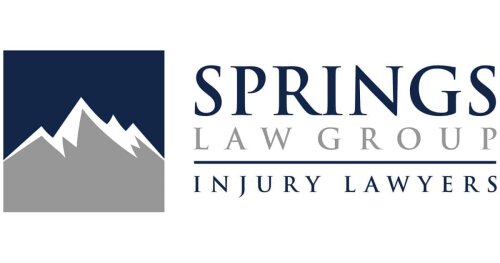
Best Insurance Lawyers in Colorado
Share your needs with us, get contacted by law firms.
Free. Takes 2 min.
Or refine your search by selecting a city:
List of the best lawyers in Colorado, United States

About Insurance Law in Colorado, United States
Insurance law in Colorado governs how individuals and businesses can protect themselves from losses through contracts with insurance providers. The law includes rules and regulations on everything from how policies must be sold and what they must cover, to how claims must be processed and resolved. Typcial types of insurance include auto, home, health, life, disability, and business insurance. The Colorado Division of Insurance is the primary state agency responsible for overseeing how insurance companies operate and protect consumers' rights. Colorado statutes and regulations are designed to ensure fairness, transparency, and prompt payment of valid claims while providing recourse for policyholders who feel they have been treated unfairly.
Why You May Need a Lawyer
Insurance law can be complex, and there are several situations where seeking legal help can be crucial. You may need a lawyer if:
- You have had an insurance claim denied or underpaid by your insurer.
- You suspect that your insurance company is acting in bad faith, such as delaying payments or failing to investigate your claim properly.
- You are facing a coverage dispute, where the insurer argues that your policy does not cover your loss.
- You need help interpreting complicated policy language or understanding your rights under your policy.
- A third party is making a liability claim against you, and your insurer refuses to defend you.
- You are involved in a lawsuit regarding property damage, personal injury, or business loss, and need representation or advice.
- You need guidance on navigating insurance requirements for new businesses or property purchases.
- Your insurer has rescinded your policy or canceled it without what you believe is a valid reason.
Local Laws Overview
Colorado has unique laws and regulations that affect how insurance policies are written, sold, and enforced within the state:
- Prompt Payment of Claims: State law requires insurers to pay claims promptly once liability is established. Unreasonable delays can lead to penalties.
- Bad Faith Actions: Policyholders can sue insurers for unreasonably delaying or denying benefits owed, potentially recovering double damages and attorney fees.
- Regulation on Premiums and Cancellations: The Colorado Division of Insurance governs how and when insurers can change premiums or cancel policies, especially regarding auto and homeowners policies.
- Mandatory Coverage: There are state requirements for certain types of insurance, such as auto liability and workers' compensation.
- Consumer Protections: Colorado law mandates clear disclosure of policy terms, coverage limits, and exclusions to prevent deceptive practices.
- Uninsured and Underinsured Motorist Coverage: Insurers must offer this protection with all auto policies, and denials must be in writing if the policyholder opts out.
Frequently Asked Questions
What types of insurance are required by law in Colorado?
Auto liability insurance and workers' compensation insurance (for most employers) are both mandatory. Homeowners, renters, life, and health insurance are not required by law but may be required by lenders or landlords.
What is bad faith in insurance, and how is it handled in Colorado?
Bad faith occurs when an insurer unreasonably withholds benefits, denies claims without justification, or delays payments. Colorado law allows policyholders to sue for double damages and attorney fees in proven bad faith cases.
How long does an insurance company have to settle a claim in Colorado?
State law generally requires insurers to accept or deny claims within a reasonable period, often 60 days, once all requested information is provided.
Can my insurer cancel my policy without notice?
No, Colorado law requires advance written notice before cancellation or non-renewal, usually at least 30 days for most policies.
What can I do if my insurance claim is denied?
You can request a detailed written explanation, file a formal complaint with the Colorado Division of Insurance, and consult with an attorney about possible legal action.
Are pre-existing conditions covered under health insurance in Colorado?
Yes, under state and federal law, health insurers cannot deny coverage or charge higher premiums due to pre-existing conditions.
Is Colorado a no-fault state for auto insurance?
No, Colorado operates under a traditional fault-based system, meaning the at-fault driver's insurance covers damages.
How do I file a complaint against my insurance company?
You can file a complaint online or by mail with the Colorado Division of Insurance, detailing your issue and including supporting documents.
Can I sue my insurance company if I disagree with their decision?
Yes, if you believe your insurer has breached your contract or acted in bad faith, you can seek legal recourse in court.
Do insurance laws differ for business and personal policies in Colorado?
Yes, while some protections overlap, certain laws and regulations apply specifically to business insurance, such as commercial liability and workers' compensation.
Additional Resources
If you need more information or assistance, consider reaching out to:
- Colorado Division of Insurance - Regulates the insurance industry and helps resolve consumer disputes.
- Colorado Bar Association - Offers lawyer referral services for finding an insurance law attorney.
- National Association of Insurance Commissioners (NAIC) - Provides consumer information and resources on insurance issues.
- Legal Aid and Pro Bono Services - Local nonprofit organizations may provide low-cost or free legal help for qualifying individuals.
Next Steps
If you believe you need legal help with an insurance issue in Colorado, start by:
- Gathering all relevant documents, including policies, correspondence, and claim records.
- Contacting your insurer to try to resolve the issue directly, ensuring you keep records of all communications.
- Filing a formal complaint with the Colorado Division of Insurance if your issue remains unresolved.
- Consulting a qualified insurance law attorney for guidance on your specific case, especially if you are considering legal action.
- Reviewing your policy and any related state laws to better understand your rights and potential remedies.
Taking prompt action and documenting your interactions can help protect your interests and improve your chances of a favorable outcome.
Lawzana helps you find the best lawyers and law firms in Colorado through a curated and pre-screened list of qualified legal professionals. Our platform offers rankings and detailed profiles of attorneys and law firms, allowing you to compare based on practice areas, including Insurance, experience, and client feedback.
Each profile includes a description of the firm's areas of practice, client reviews, team members and partners, year of establishment, spoken languages, office locations, contact information, social media presence, and any published articles or resources. Most firms on our platform speak English and are experienced in both local and international legal matters.
Get a quote from top-rated law firms in Colorado, United States — quickly, securely, and without unnecessary hassle.
Disclaimer:
The information provided on this page is for general informational purposes only and does not constitute legal advice. While we strive to ensure the accuracy and relevance of the content, legal information may change over time, and interpretations of the law can vary. You should always consult with a qualified legal professional for advice specific to your situation.
We disclaim all liability for actions taken or not taken based on the content of this page. If you believe any information is incorrect or outdated, please contact us, and we will review and update it where appropriate.
Browse insurance law firms by service in Colorado, United States
Colorado, United States Attorneys in related practice areas.
Browse insurance law firms by city in Colorado
Refine your search by selecting a city.








